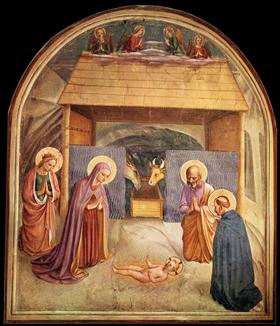September 24, 2018
Mercy Day
The Nativity
 Among the oxen (like an ox I’m slow)
Among the oxen (like an ox I’m slow)
I see a glory in the stable grow
Which, with the ox’s dullness might at length
Give me an ox’s strength.
Among the asses (stubborn I as they)
I see my Saviour where I looked for hay:
So may my beastlike folly learn at least
The patience of a beast.
Among the sheep (I like a sheep have strayed)
I watch the manger where my Lord is laid;
Oh that my baaing nature would win thence
Some woolly innocence
-C.S. Lewis
This lovely Nativity poem was given to me by one of my Mercy community who is 103 years. Always a reader and a learner, she had a selection of texts she had noted over the years, among them this unusual poem.
C.S. Lewis (1898-1963) was born in Belfast. His mother died when he was ten, and his lawyer father had Lewis and his brother educated in England. Lewis was to distinguish himself as a scholar in medieval literature, teaching mainly in Oxford and in later life in Cambridge. But he was also a great popular writer and is more widely read for his writings for children, The Chronicles of Narnia, and for his Christian apologetic writings which shone a light of faith in the bleak aftermath of World War II. Ever a truth seeker, Lewis had been a conscientious and argumentative atheist for many years, but his little book, Surprised by Joy, tells how he came to Christian faith in his mid forties. It was a question of discovering that truth can also be joy, a joy related to the joy he had always longed for as he studied medieval myths and sagas, and which was now openly addressing him in the Christian synthesis. As he reluctantly acknowledged, the divine compulsion was his merciful liberation.
As we read in the poem, Lewis is very much at home with the animal world. But then he would have been aware of the ‘bestiaries’ of the Middle Ages which gave animal life a distinct identity and role in creation. And as we know his Narnia Chonicles are peopled with animals. We can imitate these animals as moral agents of goodness, and we are drawn to Aslan, the Lion King the heart’s desire, who is a kind of Christ figure. But I suggest that it is possible to say that this great thinker and man of words is drawn to the beasts for other reasons. For the beasts are without words and there is a wordless side to Lewis.
Biographers are unsure how to handle this unspoken Lewis. It has somehow to do his domestic arrangements, which seemed a bit bungling and unlikely for an academic. After the First World War he returned to Oxford and lived with a Janie Moore, the mother of a wartime room-mate who was killed in 1917. Biographers are uncertain as to what the relationship was: did Lewis find with her the home he never had because he lost his mother? We do know that he supported her and her daughter financially and played a practical part in running the home and caring for her during her final years of dementia. Then there was his brother Warnie, for whom he was a loyal support, and through whose alcoholic binges he must have suffered. And most surprising to all to his friends, his relationship in the mid 1950s to the American, Joy Davidson who specially came to Oxford to meet him. He continued to support her financially and made it possible for her to live in England with her two sons. A domineering woman, so his friends thought; they felt Lewis was being used. But yet we are told that he eventually saw in her his muse. When she was diagnosed with terminal cancer, his pity turned to love. They were married and had a few happy years together. We know also that after her death, the shatteringly good book, A Grief Observed, was wrung from him. His more cerebral academic friends, though sympathetic, were nonplussed, and appeared not to know this other Lewis. Yet in the Nativity poem it is this unarticulated life that this man of letters brings to the fore. Words are not needed in this place of glory. He feels one with the animals in their dumb adoration and prays for their strength, their patience, their innocence.
Messages to: Jo O'Donovan rsm
Poetry commentary by Sr Jo previously published on mercyworld.org:
* To My Daughter Betty, the Gift of God by Tom Kettle
* The Hospital by Patrick Kavanagh
* I See His blood Upon the Rose by Joseph Plunkett
* Eucharist by Nora Wall rsm
* 'Spring' by Gerard Manley Hopkins sj
*'Travelling through the Dark' by William Stafford
* 'Men Go To God' by Dietrich Bonhoeffer
* 'Advent' by Patrick Kavanagh
* 'This Above All is Precious and Remarkable' by John Wain
* 'Spring and Fall: To a Young Child' by Gerard Manley Hopkins sj
Image: Nativity. Fra Angelico (1440-1441)